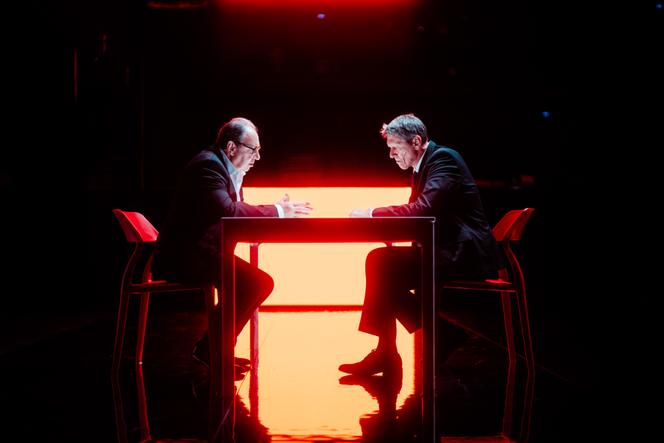


Russia is not a good place to live, as Roland Auzet's icy staging of Le Mage du Kremlin suggests. Freely adapted from the novel The Wizard of the Kremlin by Giuliano da Empoli, which was awarded the Grand Prix du Roman by the Académie Française in April 2022, this show opens the season of La Scala Paris on a note of downright seriousness.
The play is almost two hours long: two hours of a serious performance about the toxic political state of contemporary Russia. The analysis of Putin's regime, its fascism, its disciples scattered across the globe, does not lend itself to light-heartedness at a time when many autocrats are lying in wait on both sides of Europe. It is all the more difficult to smile as the production uses − and abuses − video and sound effects to amp up the drama.
The show is set against an impressive backdrop of cold videos, blinding lights and aggressive strobing. It's a set design that is not discreet, whose visual force takes the audience hostage. What the actors say evades comprehension − and there are plenty of words pouring off the Scala stage in French, or even belched out in Russian and which are not always translated. There are torrents of sentences that fail to make sense or shake off their literary jargon.
Da Empoli's style, flamboyant on paper, weighs down the actors' speech. Despite being equipped with high-frequency microphones and directed on stage as if they were performing an episode of a TV series, they must brave tortuous logorrhea and race to the ends of sentences in search of oxygen. For some, the journey becomes a marathon. All of this doesn't help to understand the play's theoretical discourse on Russia, past and present.
But it would be unfair to blame the difficulties in understanding the text solely on the performers. The problem is much bigger. Are we in fact capable of grasping, in two hours, the profound nature of a country whose past or present history is foreign to us? Tsarism, communism, the USSR, perestroika and, last but not least, Vladimir Putin: Whether living under democracy or dictatorship, the Russian people stand firm, but they are not easily deciphered.
The Belarusian writer Svetlana Alexievich may have painted an edifying portrait of post-Soviet Russia in her 2016 book Secondhand Time: The Last of the Soviets, but its reality remains an unfathomable enigma. Da Empoli's novel addresses this enigma, and the show relays it, at the risk of becoming engulfed in it.
This is the fictional story of a 21st century tsar-maker. His name is Vadim Baranov. The man never existed. The novelist invented a biography, convictions and denials. But he could have been one of those oligarchs who, in 2000, once the fall of Boris Yeltsin had been decided, propelled Putin from the KGB to the Kremlin, installed him in the presidency and made him their own, before realizing that their creature had freed himself and that they had lost control for good.
You have 41.27% of this article left to read. The rest is for subscribers only.
